Veterans are using pot to ease PTSD, despite scant research
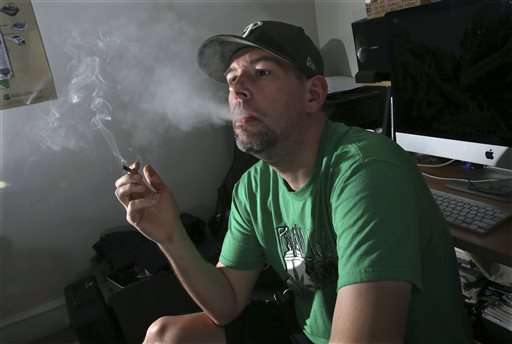
A growing number of states are weighing whether to legalize marijuana to treat post-traumatic stress disorder. But for many veterans, the debate is already over.
They're increasingly using cannabis even though it remains illegal in most states and is unapproved by the Department of Veterans Affairs because major studies have yet to show it is effective against PTSD.
While the research has been contradictory and limited, some former members of the military say pot helps them manage their anxiety, insomnia and nightmares. Prescription drugs such as Klonopin and Zoloft weren't effective or left them feeling like zombies, some say.
"I went from being an anxious mess to numbing myself with the pills they were giving me," said Mike Whiter, a 39-year-old former Marine who lives in Philadelphia, where marijuana is illegal. "Cannabis helped me get out of the hole I was in. I started to talk to people and get over my social anxiety."
Others, though, have seen little benefit from the drug. And the VA has documented a troubling rise in the number of PTSD-afflicted veterans who have been diagnosed with marijuana dependence, which some experts say can hamper recovery from war trauma.

Sally Schindel, of Prescott, Arizona, said the VA diagnosed her son Andy Zorn with PTSD after he served in the Army in Iraq. The agency later diagnosed him with marijuana dependence as well as depression and bipolar disorder, she said.
Schindel said her son was using marijuana not for recreation but as self-medication, particularly to help him sleep. He killed himself at age 31 in 2014, writing in his suicide note that "marijuana killed my soul & ruined my brain."
"He told me he found it much harder to quit than he thought it would be," Schindel said. "He'd buy it and smoke it and then flush the rest of it. The next day he bought it again."
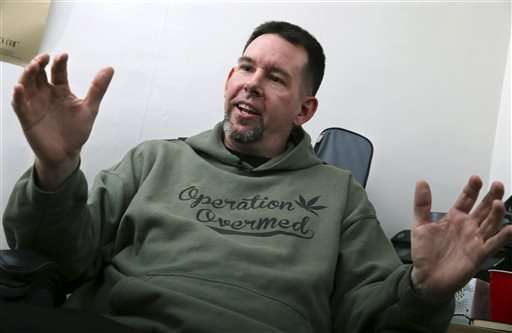
The stories of vets like Zorn and Whiter have helped fuel the debate over whether states and the federal government should legalize the drug for PTSD treatment. Lawmakers are increasingly sympathizing with vets like Whiter, despite the lack of scientific evidence. While some limited studies have shown that marijuana helps people manage PTSD symptoms in the short term, another suggested it may make symptoms worse.
Starting with New Mexico in 2009, 10 states have listed PTSD among the ailments for which medical marijuana can be prescribed, according to the Marijuana Policy Project, which seeks to end criminalization of the drug. A few more states give doctors broad enough discretion to recommend pot to PTSD sufferers.
Similar measures have been introduced in Georgia, Illinois, New Hampshire, New Jersey, Pennsylvania, Rhode Island and Utah. In November, the U.S. Senate passed an amendment that would allow VA doctors to recommend medical marijuana to vets in states where it's legal. The proposal failed to pass the House.
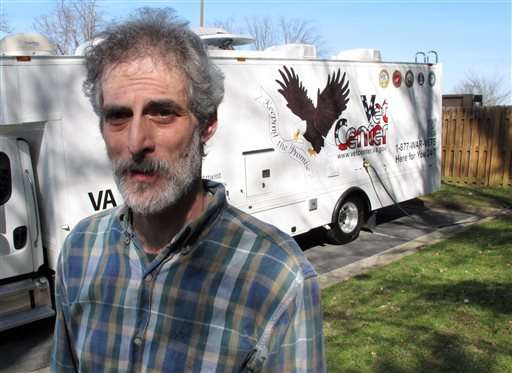
Federal law requires randomized, controlled trials to prove that a drug is effective before VA doctors can recommend it. Such studies are underway, including two funded by Colorado, where the state health board held off on legalizing marijuana for PTSD because of the lack of major studies.
"There surely is not enough scientific evidence to say marijuana helps PTSD," said Marcel Bonn-Miller, a University of Pennsylvania professor who is leading the Colorado-backed studies. "But we'll get a heck of a lot closer to getting to know the answer in two to three years."
Since 2002, the percentage of PTSD-afflicted veterans who have been diagnosed with marijuana dependence has climbed from 13 percent to nearly 23 percent, according to VA data released last year. That translates to more than 40,000 veterans.
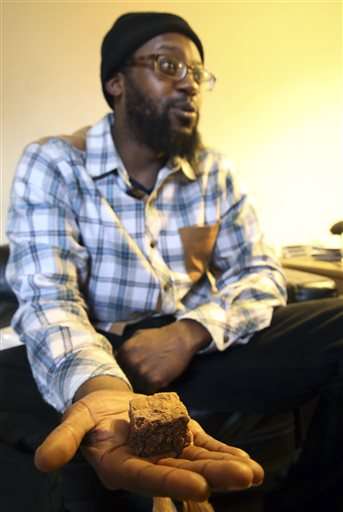
Officially known as "cannabis use disorder," dependence can mean someone is unable to sleep or becomes irritable without the drug. It can also mean marijuana use has diminished someone's personal relationships or ability to hold a job.
Dr. Karen Drexler, the VA's deputy national mental health program director for addictive disorders, said the potential for dependency is yet another reason vets should wait for more research.
"Marijuana may initially provide some relief," but for those with PTSD, "it's very hard to stop it once you start it," she said. "It gets into this vicious cycle."
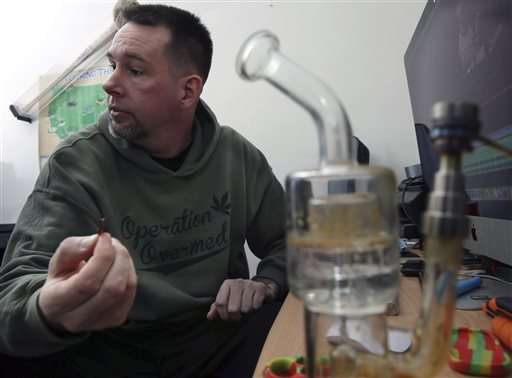
She added that the emotion-numbing effects of marijuana can also hinder the most effective treatment for PTSD: talk therapy, in which veterans try to process the trauma they went through.
Some veterans and some doctors disagree.
In Maine, where marijuana can be prescribed for PTSD, Dr. Dustin Sulak, a physician in private practice, said doctors can help vets manage their marijuana use, preventing dependence. Sulak also said pot can help vets engage in talk therapy.
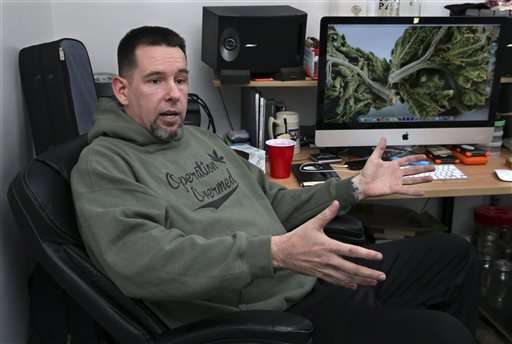
Whiter, the vet from Pennsylvania, said that was his experience.
During his time in Iraq in the mid-2000s, Whiter said, he saw roadside bombs blow up Humvees and people get shot. After he got home, the smell of hot dogs triggered flashbacks to the smell of burning flesh. The VA eventually diagnosed him with PTSD and prescribed medications including Klonopin and Zoloft.
The Klonopin left him nearly unable to function, he said, and he decided to try marijuana after reaching a point "where I didn't care if I lived or died."
"I started really engaging in therapy every week and started being really honest with myself and getting over things," said Whiter, who added that he still takes some Zoloft for his anxiety. "I can't push enough that therapy is very key in this. It's not just weed."
-
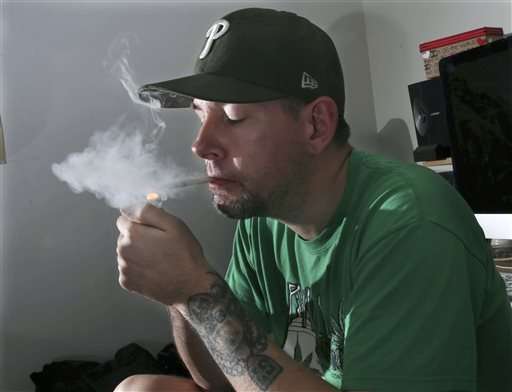
In this March 10, 2016, photo, former U.S. Marine, Mike Whiter lights a marijuana cigarette before he starts editing a video project at his home in Philadelphia. A growing number of states are weighing whether to legalize marijuana to treat PTSD. While the research has been contradictory and limited, some former members of the military say marijuana helps them manage their anxiety, insomnia and nightmares. (AP Photo/Mel Evans) -
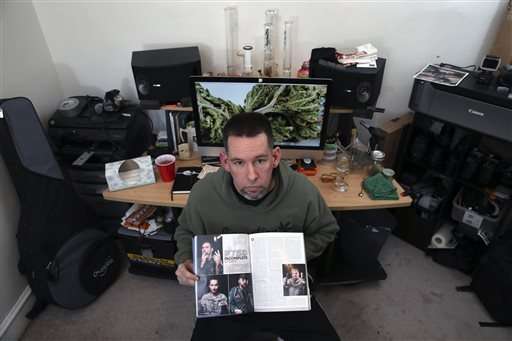
In this Feb. 26, 2016 photograph, former U.S. Marine Mike Whiter, who uses marijuana to treat post-traumatic stress disorder, displays some of his photographs of military personnel published in a magazine, as he sits at a desk in his home in Philadelphia. A growing number of states are weighing whether to legalize marijuana to treat PTSD. While the research has been contradictory and limited, some former members of the military say marijuana helps them manage their anxiety, insomnia and nightmares. (AP Photo/Mel Evans)
© 2016 The Associated Press. All rights reserved.

















